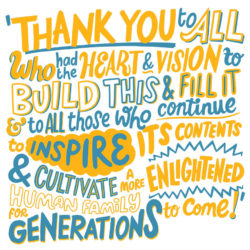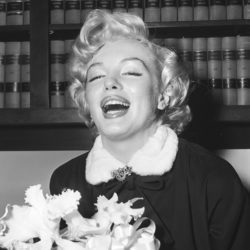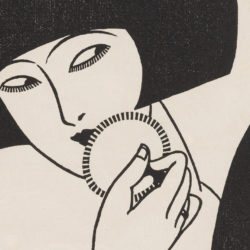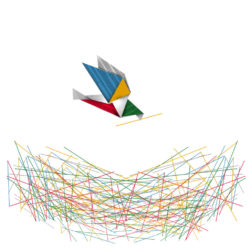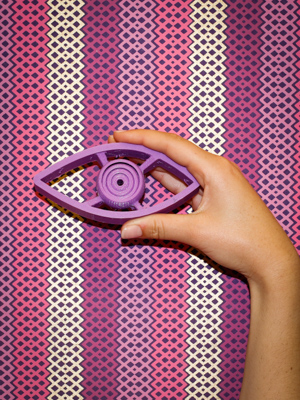
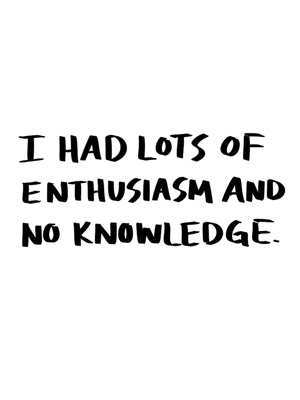
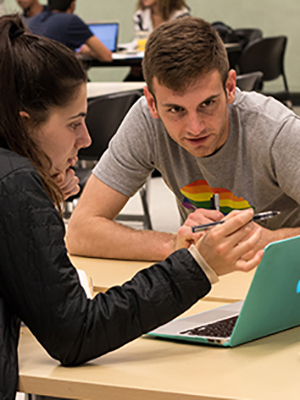
In a new pilot program, undergraduate fellows consult their peers on Library services and research skills, inspiring new ideas and self-confidence. Pictured at right, Ross Mattheis ’18, a former Library fellow, helps a student in Moffitt Library.
As a freshman at UC Berkeley, where musky, 150-year-old wisdom perfumes every hall, it can be easy to feel lost, with hurdles at each turn.
A couple of years later, things mostly get better. You make a few friends, you join a few clubs. You pick a major and find a home. By and by, confidence grows.
But what if the process didn’t have to take so long?
That question is at the heart of a new program launched by librarians this spring, aimed at emboldening students to ask questions and empowering them to find answers.
“Asking for help is a vulnerable behavior — no one likes to do it; we know this, it’s a fact,” says Nicole Brown, who heads instruction services for the Library. “We’re trying to make it easier.”
The new pilot — the Library Undergraduate Fellowship program — brings together students and librarians from diverse backgrounds into a single support system. In the program, librarians mentor the fellows and coach them on the Library’s network of services. In return, fellows teach librarians what it’s like to be an undergraduate and how to make those services accessible.
“When I landed (on campus), I had no resources, no idea how research should look at all,” says Ross Mattheis, who graduated this spring. “Half of the time it was just me beating my head against a wall, by which I mean I had lots of enthusiasm and no knowledge.
“I didn’t know if my questions were interesting enough to talk to a librarian about,” he continues.
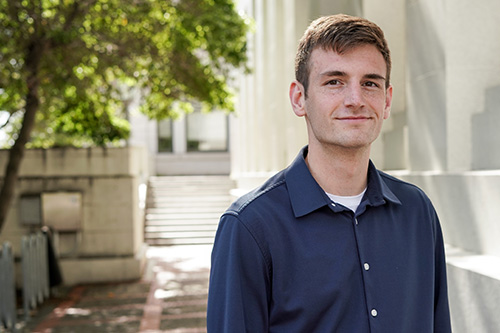
Undergraduate fellow Ross Mattheis helped other students navigate the Library. (Photo by Jami Smith for the UC Berkeley Library)
‘For undergraduates, by undergraduates’
Last year, Mattheis dreamt up an alternative: a peer-to-peer data consulting network, designed specifically for the hordes of students interested in data science. (Data 8, a class on the foundations of data science, is the fastest-growing course in UC Berkeley history.)
The Library — having only a handful of librarians versed in data analysis — had not really been equipped to handle the burst, according to Josh Quan, data services librarian. So last fall — guided by Mattheis’ vision — Quan cobbled together a crew of undergraduate data whizzes, including Mattheis, to help the Library keep up.
“Data shouldn’t be such a mysterious thing,” Quan says. “And it’s doing undergraduates a disservice by not lowering that barrier to entry.”
Since September, the Data Peers, who tutor in Moffitt, have grown in number from three to 20 students. Inspired by that success, librarians imagined a medley of complementary disciplines and created the fellowship. The Library also launched a Data + Digital Research Help desk, on Moffitt’s first floor, staffed by librarians and the fellows.
At the desk, the fellows help their peers delve into topics ranging from sifting through online journals to 3-D printing medical devices.
The goal? Get more undergraduates to ask for help.
The trick? Disguise that help as a 20-year-old in Birkenstocks, chilling in Moffitt.
As Mattheis puts it, “Peers are more approachable than a 40-year-old dude.”
Each of the eight fellows is an expert of sorts in four areas: data science, digital humanities, library research, and the Makerspace (a design and innovation hub in Moffitt Library). Come fall, there will also be fellows specializing in media creation and geographic information systems.
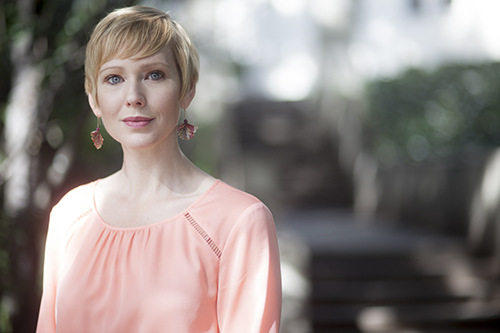
Nicole Brown, who heads instruction services for the Library, is helping run the fellows program. (Photo by J. Pierre Carrillo for the University Library)
Brown — who speaks in quick flourishes, flying from the hip despite a folder of notes — emphasizes that, for now, the program is an experiment. It’s the first time the Library has tried anything like it.
“Our hope is to create a library that’s for undergraduates, by undergraduates,” Brown says. “How we get there, the possibilities are infinite.
“We’re trying to do something, and if we try to be perfect, we’ll never get it done,” she says. “So let’s go. Let’s try.”
All students welcome
Aside from their work at the desk, fellows have research projects related to their area of expertise, and a mentor to oversee their work.
Brown mentors the two fellows who specialize in library research. This semester, she gave her students, Caitlin Cozine ’20 and Kristina Smelser ’21, a mission: Shadow the reference desks in various libraries, noting the barriers and uncertainties that undergraduates face in those corners.
In Doe Library, for instance, students often confuse circulation for the reference desk — so libraries should put up more engaging signs to differentiate the two, Cozine says. Students are hesitant to approach the reference desk in Doe, she says, mostly because “they don’t know what to ask.”
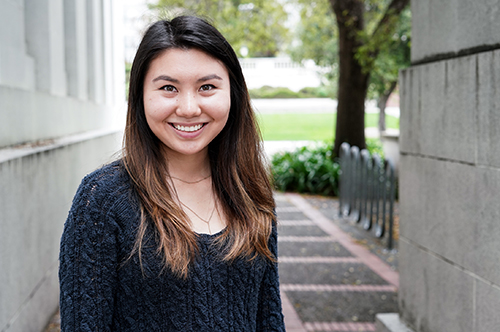
Caitlin Cozine, an undergraduate fellow, grew up in libraries and volunteered at her local branch in high school. (Photo by Jami Smith for the UC Berkeley Library)
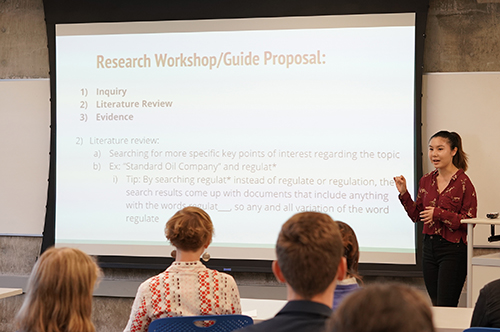
Cozine presented her research about reference desks in May. (Photo by Cade Johnson for the UC Berkeley Library)
Cozine — who has spent the past four summers teaching English abroad — grew up in libraries and volunteered at her local branch throughout high school. After college, she’s considering a career in education policy as a way to dismantle inequalities in school systems.
For her, breaking down barriers isn’t just a project — it’s a lifelong passion.
“We have so many students from all these different backgrounds, and it’s easy to think, we all got here, we’re all smart — but, at the same time, we all come from so many different social and economic levels,” Cozine says.
“Someone may look at the Doe Library and see it as this big, intimidating building, with Athena’s head over the doorway,” she continues. “Part of our job as library fellows is making sure all students feel welcome in the Library.”
Virgie Hoban
July 2, 2018

